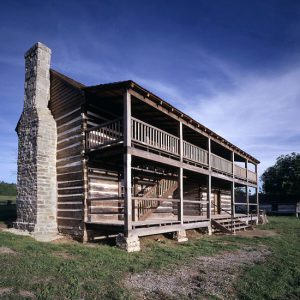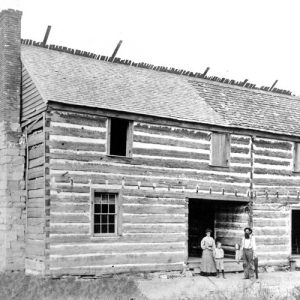calsfoundation@cals.org
Jacob Wolf (1786–1863)
Jacob Wolf was an Arkansas pioneer, territorial legislator, county official, militia officer, post master, and community leader. In 1825, he established the first permanent courthouse for Izard County, and it still stands as the oldest public structure in Arkansas.
Jacob Wolf was born on May 12, 1786, in Rowan County, North Carolina, one of the eleven known children of Michael and Cathrina Wolf of Pennsylvania German descent. Shortly before 1800, the family moved to Hopkins County, Kentucky, where Wolf married his first wife, Mildred Meredith, on March 9, 1809. Before her death in about 1820, they are thought to have had five children. Shortly afterward, Wolf migrated to the Arkansas frontier to join members of his extended family, who had arrived in about 1814. They had already established a prosperous settlement along the Big North Fork of the White River in the northern part of the territory. Among those settlers were his father; one of his brothers, Charles; and his brother-in-law, Mathew Adams. On November 15, 1824, Wolf purchased some seventy-six acres of government land just below the mouth of the Big North Fork River. Here on the heights overlooking the White River where the town of Norfork (Baxter County) now stands, he built a large two-story house of hewn pine logs. The house still stands and is one of the oldest log structures in northern Arkansas. It was furnished with fine furniture brought from the east up the White River by canoe. It was into this well-appointed house that Wolf moved his family and his second wife, Elizabeth Lantz Saunders.
On October 27, 1825, the Arkansas territorial legislature created a new county out a portion of western Independence County. It was named Izard, and the first seat of government was at the house of Jacob Wolf. One of the second-floor rooms became the courthouse for the new county, making it the oldest existing courthouse structure in the state. Several members of Wolf’s extended family were among the county’s first officials. In March of the following year, a post office was established at Wolf’s residence and called Izard Courthouse. Wolf himself became postmaster within a few months. A village, locally known as Liberty, soon grew up around the new courthouse. By 1830, it consisted of a store, a blacksmith shop, a tavern, and a saw and grist mill. Wolf operated the store and the blacksmith shop and, in these capacities, had frequent contact with the Native Americans who lived along the White River.
Shortly after arriving in Arkansas Territory, Wolf was commissioned as a major in the local militia regiment. He would retain this title throughout the remainder of his life. He began his Arkansas political career in 1827 when he was elected to the Territorial Legislative Council, the forerunner of the Arkansas Senate. He maintained this seat through the remainder of the territorial period, serving five successive terms. In 1834, Wolf used his influence to have the first road constructed through the area. In 1835, a new county, Marion County, was carved from the western part of Izard County. The Izard County seat was then moved down the White River to a new community called Athens. With the exception of a term as Izard County treasurer from 1842 to 1844, Wolf then seems to have retired from public life. However, several of his sons and sons-in-law remained active in county politics until after the Civil War. Later, Judge David Walker compared Wolf’s political career to those of John Ringgold, C. F. M. Noland, James Polk, and Walker himself.
In 1844, Wolf’s settlement was renamed North Fork, now Norfork, and he was appointed postmaster. He retained this position until his death. His second wife died in about 1846, and he married his third wife, Cynthia H. Shipp, two years later. Wolf was the father of sixteen children in total. Throughout his life, he was an active supporter of the work of the Baptist denomination. He was deacon in his local congregation. His brother, the Reverend John Wolf, was a pioneer Baptist minister along the White River. During the Civil War, Union forces occupied North Fork. When they attempted to take Wolf’s home for their use, the old man is said to have attacked them with his cane. For this action, he was imprisoned for several months. This contributed to his death on January 1, 1863.
In 1915, in an article published in the Arkansas Gazette, Wolf was recalled as a “large, brawny man with clear blue eyes crowning a strong brave countenance.” In a photograph made in 1851, the major is surrounded by his most cherished possessions: his anvil, his hammer, his Bible, his small hymn book, and his spectacles.
For additional information:
Baker, Russell P. “Jacob Wolf.” Arkansas Historical Quarterly 37 (Summer 1978): 184–192.
Blevins, Bill D. Jacob Wolf: The Mansion & the Man. N.p.: 1982.
Historic Wolf House: The Family and the Times. Norfork, AR: 1985.
Jeffery, A. C. Historical and Biographical Sketch of the Early Settlement of the Valley of the White River. Batesville, AR: 1973.
Watson, Rev. Patrick S. G. “Recollections of Arkansas No. 5.” Arkansas Evangel (Dardanelle), October 5, 1881, p. 1.
“The Wolf House Historian.” Norfork, AR, 1989.
“Wolf House, Home of Pioneer, Stands.” Arkansas Gazette, April 11, 1915, part 2, p. 7.
Russell P. Baker
Mabelvale, Arkansas







He is also an ancestor of mine. I have genealogy on the families of Wolf/Adams. Wish I knew more.
I had never heard the story that Reverend John Wolf (Major Jacob Wolf’s brother) had been imprisoned, etc. I had always heard that he had died with his regiment and was buried somewhere on Crowley’s Ridge on 7/30/1863. I would love to hear more of this story about his defense of property with the cane, as well as where he might be buried, if anyone knows of the exact location of his grave.
He was my great-great-grandfather.